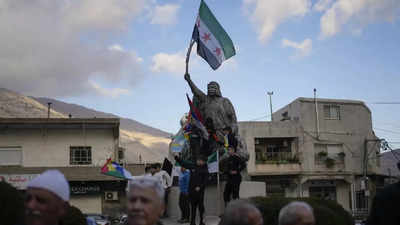
Israel launched more than 100 airstrikes on military sites in Syria on Monday, targeting facilities and assets linked to the former Assad regime.
According to the Syrian Observatory for Human Rights, these strikes included attacks on the Barzah scientific research centre near Damascus, which Western countries suspect of ties to chemical weapons production.
The Observatory also reported strikes on weapons depots in Deir Ezzor province and the Qamishli military airport in the northeast. Boats from the former Syrian navy were destroyed in the Latakia seaport, and air defence installations near the Mediterranean were also targeted, as confirmed by Syrian security sources.
Israel’s foreign minister Gideon Saar described the deployment of Israeli troops into a buffer zone in the Golan Heights as a “limited and temporary step” necessary for security reasons. The region, annexed by Israel in 1981, has become increasingly volatile following Assad’s removal.
Israel, which has long conducted operations against Iran-linked targets in Syria, has intensified these efforts in light of the ongoing Gaza conflict and regional instability.
According to Reuters, regional security sources said that recent strikes included attacks on facilities previously identified as being used by Iran to develop advanced missiles.
Hezbollah condemns Israeli strikes
Lebanon’s Hezbollah has denounced the recent escalation of Israeli airstrikes in Syria, issuing a strong statement on Monday condemning Israel’s actions.
As per the news agency AFP, the group criticised what it described as the “occupation of more land in the Golan Heights” and the destruction of Syria’s defensive capabilities following the overthrow of President Bashar al-Assad.
In a statement, Hezbollah declared, “While we affirm our support for Syria and its people, we stress the necessity to preserve Syria’s unity.” It accused Israel of using the volatile situation in Syria to expand its territorial reach and weaken the country militarily.
The remarks come as Hezbollah, a long-time ally of the Assad regime, faces a changing landscape in Syria. Assad, who had ruled for more than two decades, was ousted by rebels last weekend, ending his family’s half-century-long rule.






